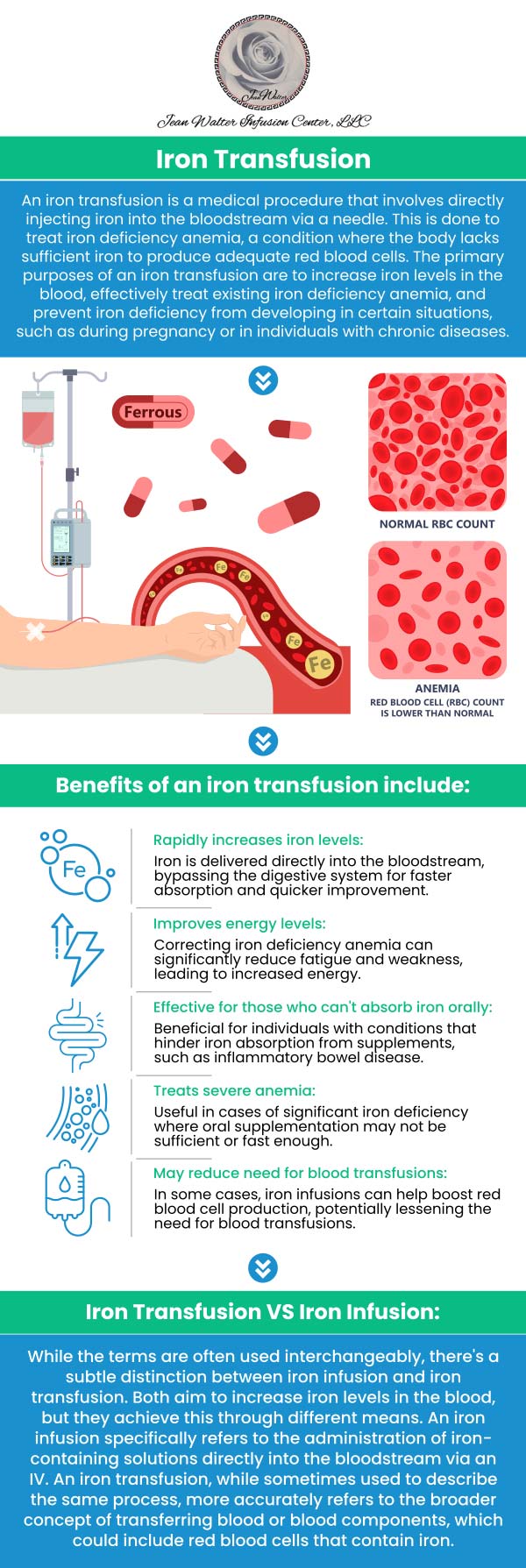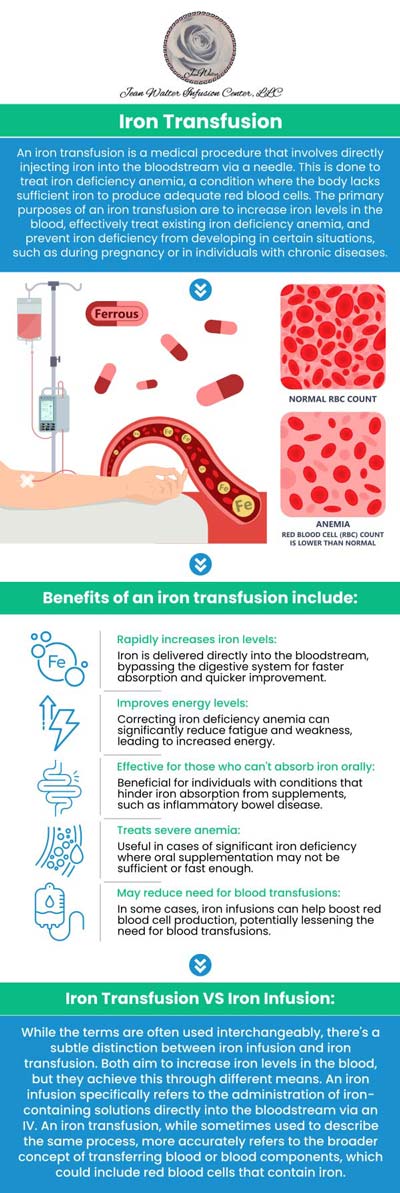Iron Transfusion: Restoring Your Body’s Iron Levels
Iron transfusion is a highly effective treatment designed to restore your body’s iron levels, alleviating symptoms of iron deficiency anemia such as fatigue, weakness, and shortness of breath. At our clinic, Dr. Nasser Nasseri, MD, and our team provide personalized care to ensure you receive the best possible outcome from your treatment. With a focus on comfort and safety, our expert team is here to help you regain your health and vitality. Contact us today or book an appointment online to take the first step towards better health. We have convenient locations to serve you in Edgewater MD, Rosedale MD, North Baltimore MD, Columbia MD, Glen Burnie MD, and Catonsville MD.




Table of Contents:
What is an iron transfusion?
Why would someone need an iron transfusion?
What are the benefits of an iron transfusion?
How is an iron transfusion administered?
An iron infusion is a medical procedure that delivers iron directly into your bloodstream through an IV, providing a quick and efficient way to replenish low iron levels. It’s particularly beneficial for those with iron-deficiency anemia who haven’t responded well to oral supplements.
Our team offers iron transfusion services for patients suffering from iron deficiency anemia. If oral supplements have proven ineffective or are not well-tolerated, an iron transfusion can be an effective alternative. This procedure typically takes a few hours and involves administering iron directly into the bloodstream via an IV line.
Before treatment, our healthcare professionals perform a patch test to check for allergic reactions to the iron solution. Patients are continuously monitored throughout the procedure, addressing any side effects such as headache, muscle or joint pain, changes in taste, nausea, vomiting, or diarrhea.
Patient safety is our top priority. While severe side effects are rare, we are prepared to handle any complications that may arise, including allergic reactions, liver damage, heart failure, or infections at the IV site.
At Jean Walter Infusion Center, we aim to improve your symptoms of iron deficiency anemia and enhance your quality of life through expert care.
Iron transfusions are necessary when oral iron supplements are ineffective, intolerable, or when the body is unable to absorb or utilize iron from dietary sources, leading to iron deficiency anemia (IDA).
Dr. Nasser Nasseri specializes in comprehensive care for patients with blood disorders such as IDA. Our team offers treatments like iron transfusions to help patients combat the debilitating effects of these conditions.
Iron transfusions, also known as intravenous (IV) iron therapy, are a crucial part of the treatment strategy. These infusions are especially useful when oral supplements fail or are not an option due to certain medical conditions. Additionally, they are vital when the body’s ability to absorb iron from food is compromised.
Dr. Nasseri’s expertise enables him to identify various causes of iron deficiency, such as inadequate dietary intake, malabsorption disorders, chronic blood loss, and inflammatory diseases.
Patients with chronic kidney disease, heart failure, or those who have undergone major surgery are often considered for iron transfusions. Pregnant women who cannot maintain their iron levels through diet and supplements are also potential candidates.
Iron transfusions are conducted with utmost care and precision, considering the potential risks and side effects like allergic reactions, infections, or iron overload. The decision to proceed with an iron transfusion is guided by a patient’s clinical symptoms and lab results, with a strong emphasis on optimal health.
Under expert guidance, advanced and personalized care is provided to patients battling blood disorders. While iron transfusions are just one part of a comprehensive treatment plan, they play a crucial role in overcoming the challenges of conditions like IDA at Jean Walter Infusion.
Iron transfusions introduce iron directly into the bloodstream, offering a quick and effective way to replenish iron levels, particularly for those suffering from iron deficiency anemia.
This treatment is especially beneficial for patients who cannot absorb iron from their diet due to conditions like celiac disease or inflammatory bowel disease. By bypassing the digestive system, iron transfusions deliver iron directly into the bloodstream, helping to alleviate symptoms such as fatigue, weakness, and shortness of breath, while also reducing potential complications like heart failure and tissue damage.
Iron transfusions are also effective for patients who have experienced significant blood loss, such as post-surgery or due to traumatic injury. This procedure helps replace lost iron more quickly, aiding in faster recovery and reducing overall exhaustion.
Beyond treating anemia and supporting recovery, iron transfusions can improve cognitive function, especially in children with iron deficiency, as iron is crucial for neurodevelopment. Additionally, increasing iron levels can help alleviate restless legs syndrome by improving nerve function.
We understand that iron transfusions can be a convenient option for those who have difficulty with daily medication or prefer not to take pills. However, it’s important to discuss the potential benefits and drawbacks with your healthcare provider to determine if this treatment is right for you. Consistent monitoring of iron levels and other blood markers is essential for achieving the best treatment results. We are dedicated to providing specialized care to elevate your well-being.
Iron transfusions offer a focused solution for replenishing iron levels in patients affected by iron deficiency anemia. At our facility, this procedure is carried out in a modern, comfortable environment to ensure that patients receive the highest level of care.
Procedure:
Evaluation:
Your medical history and a physical examination will be carefully evaluated to assess the severity and underlying cause of your iron deficiency. Blood tests will then be performed to measure your iron levels and overall health, helping to determine if an iron transfusion is the appropriate course of treatment.
Preparation:
The procedure, including potential risks and benefits, will be discussed with you to ensure informed consent. You will be made comfortable in our state-of-the-art infusion center, where an IV line will be inserted into a vein, typically in your arm. Premedication may be given to prevent allergic reactions.
Iron Solution Administration:
An iron solution, a type of iron salt dissolved in sterile water, is slowly infused into the IV line over a few hours. The rate of infusion is carefully monitored by our trained healthcare professionals to prevent overload or complications.
Monitoring:
Throughout the transfusion, you will be carefully observed for any indications of allergic reactions or complications. Vital signs such as heart rate, blood pressure, and temperature will be regularly checked. Following the transfusion, blood tests may be conducted to evaluate your updated iron levels.
Post-Transfusion Care:
After the infusion is finished, the IV line will be carefully removed. Typically, you will be advised to rest and avoid strenuous activities for a few hours post-transfusion. You will be monitored for any immediate side effects, such as nausea, vomiting, diarrhea, or muscle cramps. Follow-up appointments will be scheduled to monitor your iron levels and response to the transfusion. If your iron levels remain low, another transfusion may be necessary.
Avoid an iron transfusion if you have:
• Known allergy to iron
• Iron overload
• Active infection
• Liver disease
At Jean Walter Infusion Center, your safety and well-being are our top priorities. We ensure that the iron transfusion procedure is carefully monitored and controlled to maximize its effectiveness and minimize any potential risks.
We understand the impact that iron deficiency anemia can have on your daily life, and we are committed to providing effective, compassionate care to help you overcome it. Our specialized iron transfusion services aim to restore your energy levels and improve your overall quality of life. Our experienced team is here to support you every step of the way. If you’re ready to take control of your health, contact us today or book an appointment online to begin your journey to wellness. For more information, contact us or book an appointment online. We serve patients from Rosedale MD, Edgewater MD, Columbia MD, Glen Burnie MD, Catonsville MD, North Baltimore MD, Parkville MD, Middle River MD, Dundalk MD, Halethrope MD, Ellicott City MD, Laurel MD, Hebbville MD, and Woodlawn MD.
Check Out Our 5 Star Reviews

Additional Services We Offer


- Infusion Therapy
- Injection Treatments
- Intravenous Immunoglobulin Therapy
- Medical Conditions
- Asthma
- Crohn’s Disease
- Fibromyalgia
- Gout
- Inflammatory Eye Disease
- Inflammatory Skin Disease
- Iron Deficiency
- Lupus
- Multiple Sclerosis
- Myositis
- Osteoporosis
- Rheumatoid Arthritis
- Ulcerative Colitis
- Vasculitis
- PRP Injections






